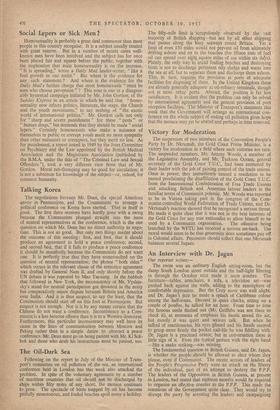The Oil-Dark Sea
Following on the report in July of the Minister of Trans- port's committee on oil pollution of the sea, an international conference held in London has this week also attacked the problem. In spite of the voluntary agreement by a number of maritime countries that oil should not be discharged by ships within fifty miles of any shore, the menace continues to grow. The spectacle of birds trapped by oil has become pitifully monotonous, and fouled beaches spoil many a holiday. The fifty-mile limit is scrupulously observed by the vast majority of British shipping—but not by all other shipping that passes along the busy seaways round Britain. Yet a limit of even 150 miles would not prevent oir from ultimately drifting ashore and on to the beaches (for fifteen tons of fuel oil can spread over eight square miles of sea within six do's). Plainly, the only way to avoid fouling beaches and destroying birds is not to discharge persistent oily sludge and waste into the sea at all, but to separate them and discharge them ashore. This, in turn, requires the provision at ports of adequate facilities for disposing 'of them. In the United Kingdom these are already generally adequate at oil-refinery terminals, though not at most other ports. Abroad, the position is far less satisfactory. It is evident that the problem can only be solved by international agreement and the general provision of port reception facilities. The Minister of Transport's statement this week that the Government will arrange an international con- ference on the whole subject of ending oil pollution gives hope that the menace may yet be abated and perhaps in time removed.


































 Previous page
Previous page